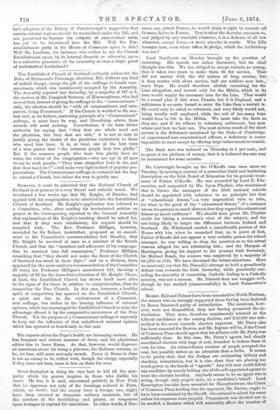However, it must be admitted that the National Church of
Scotland is at present in a very liberal and catholic mood. We mentioned a few weeks ago that Mr. Knight, of Dundee, had applied with his congregation to be admittedinto the Established Church of Scotland. Mr. Knight's application was referred to a Committee,, who, after reading his incriminated articles on prayer in the Contemporary, reported to the General Assembly that explanations of Mr. Knight's teaching should be asked for, and that if they were satisfactory, his request should be
complied with. The Rev. Professor Milligan, however, seconded by Sir Robert Anstruther, proposed as an amend- ment to the Committee's recommendation last Monday, that Mr. Knight be received at once as a minister of the Scotch Church, and that the "members and adherents of his congrega- tion be received into full communion," Professor Milligan remarking that "they should not make the doors of the Church of Scotland too strait in these days ;" and on a division, there appeired for the more cautious recommendation of the Committee 63 votes, for Professor Milligan's amendment 152, showing a majority of 89 for the immediate admission of Mr. Knight. There, at least, the Established Church has shown itself more alive to the signs of the times in relation to comprehension,.than its competitor the Free Church. In this case, however, a healthy spirit of competition has spurred on the Established Church, a spirit not due to the exclusiveness of a Communi- cant suffrage, but rather to the bracing influence of external opinion, which has encouraged the Established Church to seize the advantage offered it by the comparative narrowness of the Free Church. Yet the purpose of a Communicant suffrage is expressly to keep out the influence of that unhallowed external opinion which has operated so beneficially in this case.


































 Previous page
Previous page